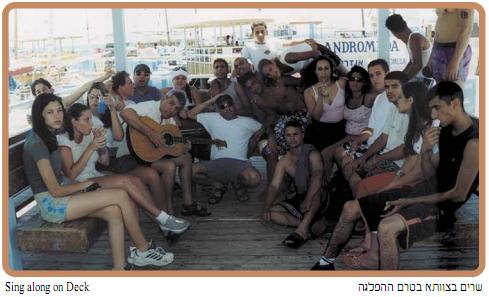Building the Bridge
FROM INSTITUTIONAL CHILDHOOD TO INDEPENDENT ADULTHOOD
Since the founding of the state of Israel, the needs of children – especially those orphaned, neglected, abused, or abandoned – has been one of the highest priorities of the Israeli government. In the aftermath of the Holocaust in Europe and the ingathering of Jews from Arab lands, needs reached crisis proportions. In response to this situation, the first Beit Hayeled (children’s home) was established in Tel Aviv more than 50 years ago.Today, institutions (including children’s homes) care for approximately 11,000 children between the ages of 6 and 14. These institutions try to meet the children’s most basic physical, security, and dependency needs. Unfortunately, they typically neglect their cultural and intellectual growth and self-sufficiency needs. To make matters worse, at the age of 14 many of these youngsters “graduate” from the institutional homes with no structured follow-up programs of any kind.

Some are lucky and return to more stabilized family situations, or are placed in Youth Villages, kibbutzim, or with foster families. However, most fare less well. Because of excessive caseworker turnover, nadequate follow-up placements and parental neglect, they are often buffeted from one placement to another, or from one helper to another, enduring a debilitating lack of stability and continuity. For them, this confirms their own sense of worthlessness.
Further, because of the constant changes in their lives, these youngsters rarely have consistent or positive role models.Young people who have never had the opportunity to experience self-expression and intimacy, to understand freedom tempered by responsibility, are poorly prepared to establish a full adult existence for themselves. 60% to 70% of these youngsters eventually drop out of school. Many become homeless and hopeless, involved with drugs and crime. They are unlikely to do army service in Israel, still a prerequisite for adult success in many spheres. Some may end up on welfare, others in jail or in the mental health system.
Since 1948, the city of Tel Aviv alone has spent an average of $4 million per year on its four children’s homes. However, it has never provided a successful program for alumni of these homes. Too often, the result of this failure has been families on welfare two or even three generations. The ultimate cost to society of abandoning these youngsters at this critical juncture in their lives is many times greater than the cost of an early intervention program. It is important to note that the majority of the children in the institutional care system since the 1970’s have been from Asian/North African immigrant families. Thus, the policies that failed these children’s parents and grandparents in the 1950’s and 1960’s are letting them down as well.
The time has come to break the cycle. There is a desperate need for professional intervention and follow-up focusing on these “lost” children and youth through continuing programs that provide a supportive environment. In order for them to have a successful future, they must be carefully guided in their adolescent years and complete their army service. Professional programs of this kind exist in other countries, particularly in the United States and Canada. Unfortunately, they do not exist in Israel.
HALEV (Hamercaz L’maan Bogrim), was established in 1997, the first program of its kind in Israel. Modeled after a successful program in the United States and Canada, HALEV is an intervention program designed to fill the critical gap in the child welfare delivery system for youngsters between the ages of 14 and 21. HALEV helps these adolescents who are in the worst possible circumstances negotiate this crucial phase of their lives. It helps them maximize their own interests and capabilities by providing counseling, skills development, and one-on-one guidance. HALEV’s skilled field workers come from the same background as these youngsters, and can therefore be mentors and role models in preparing them for army service, further education, and attaining happy and productive adult lives.

